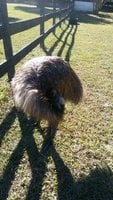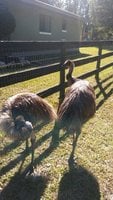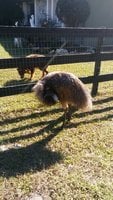juliefpc
Chirping
- Feb 6, 2017
- 55
- 57
- 91
I have had a breeding pair of Emus for about 6 months now. The male has quickly developed a severely twisted neck. He is eating and drinking fine, but it is becoming difficult for him week to week and eating his grapes and other fruit is slow and difficult for him. Has anyone experienced this? I am not planning to breed him now as I am worried this could be hereditary. I have searched high and low for a bird doctor in the Ocala or Gainesville area with no luck. I give him a full dosage of Poly Vi Sol daily (baby multivitamin power booster from Enfamil). While this gives him extra energy, I have not seen any improvement in his neck. I love this little guy and his mate trys to help him when she can. Any other tips anyone can suggest? Any help would be most appreciated as I really do not want to give up on him.











